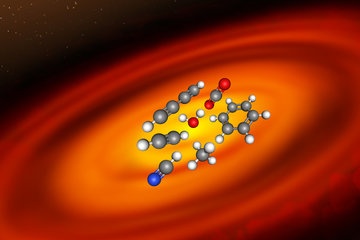Guillaume Bourdarot receives Nobel Laureate Fellowship
Guillaume Bourdarot, a postdoctoral researcher from the Infrared Group, received a Nobel Laureate Fellowship at the 75th Annual General Meeting of the Max Planck Society. Nominated by Nobel laureate Reinhard Genzel, Bourdarot is recognized for his work on high-resolution infrared observations of astrophysical objects.

Great honor for Guillaume Bourdarot: The postdoctoral researcher from the Infrared Group was awarded the Reinhard Genzel Nobel Fellowship at the 75th Annual General Meeting of the Max Planck Society in Berlin. This instrument for promoting young scientists was launched by the MPG in 2016 and offers postdocs a unique insight into the research activities of Nobel Prize winners. Bourdarot was nominated by Director Reinhard Genzel, who was awarded the Nobel Prize in Physics in 2020.
In his research, Guillaume Bourdarot is interested in building experiments for observing the Universe at the highest resolution in the infrared domain. These high-angular observations can be applied to study a variety of astrophysical objects such as exoplanets, supermassive black-holes or newborn Suns analog to our own. "The continuous progress in photonic technology and ground-based instruments, to which MPE has contributed significantly with the development of ground-breaking instruments such as GRAVITY or ERIS, has revolutionized astronomical observations," says Bourdarot.

The GRAVITY instrument makes it possible to connect the four eight-meter telescopes at the Very Large Telescope Interferometer in Chile to form a virtual telescope with a diameter of 130 meters. This interferometry technique has been used in the radio range for decades; in the infrared spectral range, however, the technical challenges are immense, and it was only with GRAVITY that the decisive breakthrough was achieved. The follow-up project GRAVITY+ is currently being prepared, in which the GRAVITY instrument will be upgraded with a new adaptive optics system, laser guide stars and an extended field of view.
Guillaume Bourdarot, who will be involved in the commissioning at ESO's Paranal Observatory in the Chilean Atacama Desert, has great expectations: "GRAVITY+ takes interferometry to the next level. The instrument has the potential to open up the extragalactic sky for observations with the highest resolution and to provide us with ever sharper images for the study of exoplanets". His conclusion: "With GRAVITY+ we are opening a new window for astronomical observations." In the long term, this will also be a key step in the prospect of additional telescopes and longer, up to kilometer baselines in interferometry.
Nobel Laureate Fellowship
The Nobel Laureates of the Max Planck Society can each nominate an outstanding postdoc for a Nobel Laureate Fellowship in recognition of their achievements. The fellows receive an employment contract at a Max Planck Institute as well as resources for research. This instrument for promoting junior scientists of the Max Planck Society provides postdoctoral fellows with a unique insight into the research activities of the Nobel Laureates. They also benefit from excellent national and international networks for their future career.
After Taro Shimizu, who received the fellowship in 2021, Guillaume Bourdarot is the second Reinhard Genzel Nobel Fellow from MPE.













